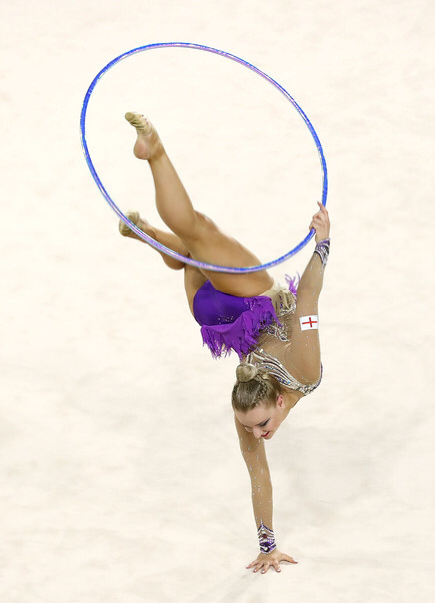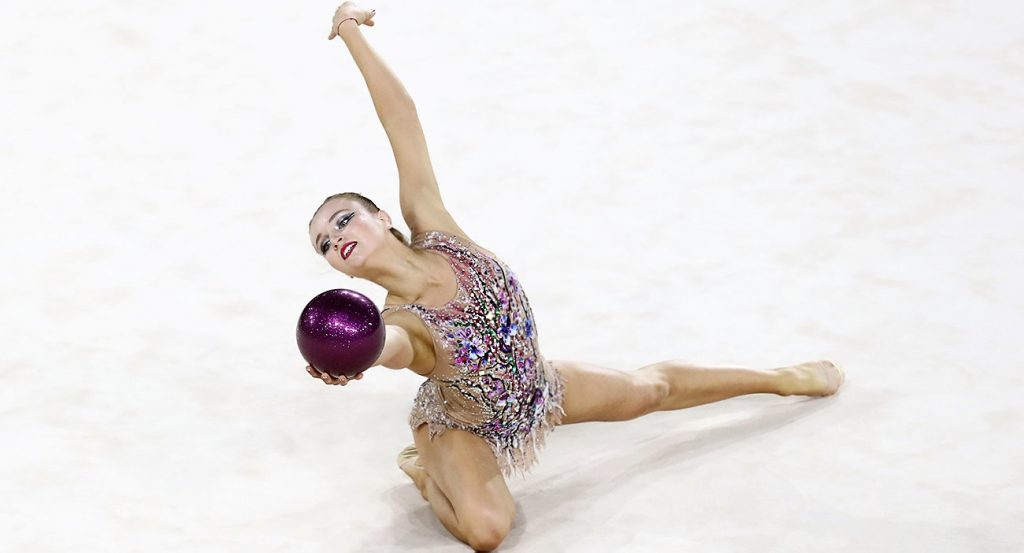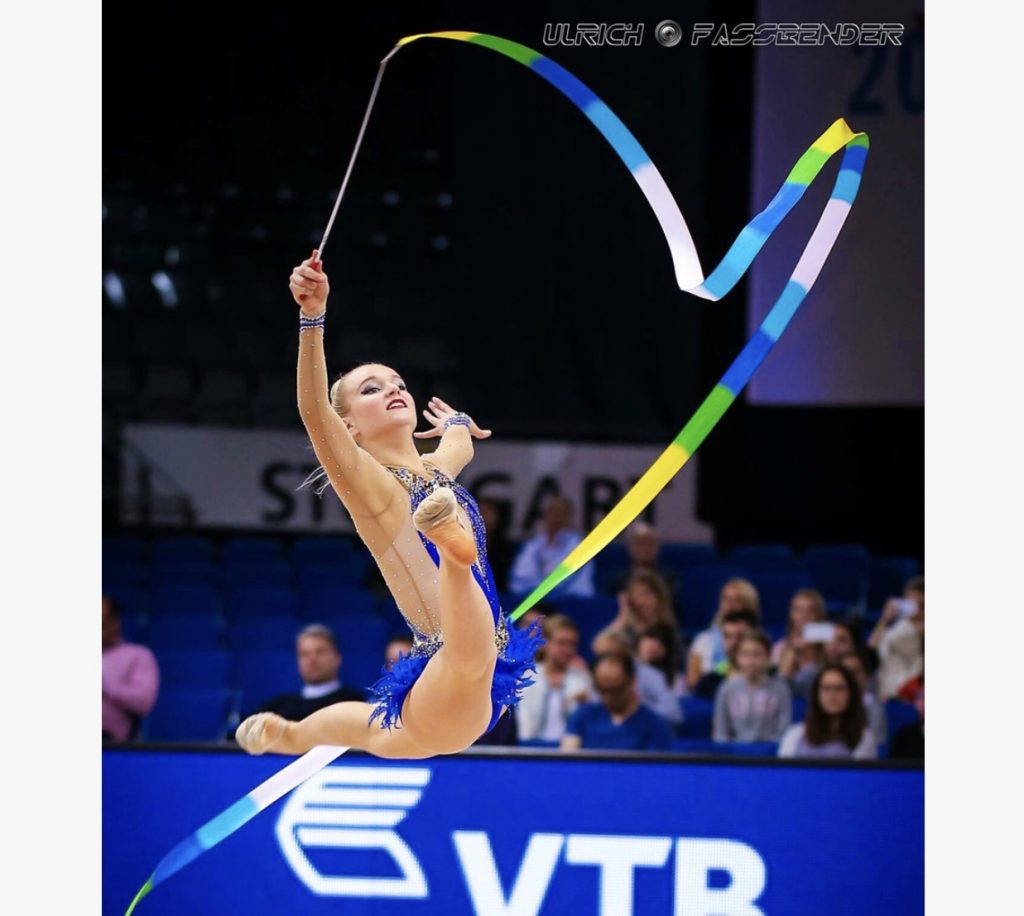“My goal was to improve rhythmic gymnastics in the country” — Stephani Sherlock on her career, doping and rhythmic gymnastics in the UK and Russia
Gymnastics was never the plan for Stephani Sherlock. Growing up in Moscow, her Russian mother was intent for her daughter to prioritise education, with the aim of moving to the UK — which she did at 13, before embarking on an undergraduate degree at St Mary’s University, Twickenham earlier this year.
Despite this — and the fact she was considered too old to start gymnastics aged ten in Russia — she persisted. Now 22, Stephani joined the Espirit team nine years ago and within 12 months was selected to the national squad.
“I think being half-Russian and starting in Russia, it put a lot of internal pressure on myself because I’ve seen the environment from inside, the training and what goes into it and how developed it is,” Stephani said, who’s in the first year of her degree in Sports Communications & Marketing.
“Because the sport is so subjective, it can sometimes be biased towards Russia, because they are so good. You have to be better competing for the UK.”

The stereotype about sport in Russia — of a culture of militaristic intensity and discipline — is something that has been around since the days of the USSR.
But, according to Stephani, this is a good thing for rhythmic gymnastics when compared to the UK. “In Russia, if you are good enough to get selected to the national squad, the rewards you get are so much higher.”
The biggest difference between the two countries is the ability to make a career out of the sport, she explained. “In Russia, you have everything paid for, it’s like a job. In the UK, I couldn’t make a career out of it, I just couldn’t sustain myself doing just gymnastics.”
This is despite the fact that Stephani is one of the best rhythmic gymnasts in the UK, but in her early twenties she has stopped pursuing the sport competitively to focus on her education, to follow a different career path.
“I’m really upset about it, because I wish I could have done it for longer as I love it so much,” she added.
“If I wasn’t dependent on my parents, I would have still been doing it. I think I have more to give. It’s not fair for my parents and for me, it wasn’t sustainable.
“I’m 22 now and wanted to do something that gives more opportunities to just live my life, to sustain myself. I think now it’s an even younger sport. You can do it for as long as someone is supporting you.
“It’s self-funded. We don’t get any funding apart from World Championships and Commonwealth Games. All the international competitions are self-funded so the parents have to pay for everything. Even though they pay, the federation still have to fill out all the forms and pay the coaches, so being the best in the country still doesn’t guarantee going to the Olympics.”
Adversity is nothing new for Stephani. In what she described as her proudest achievement, she overcame a foot injury in 2016 to win the British Championships. She said: “Every year on my birthday I wished to win the British championships.”
Representing the UK in major events like the 2014 Commonwealth games in Australia and the 2015 World Championships in Stuttgart stood out as other highlights for their unique experience. But when asked about what truly motivates her, it was something altogether more altruistic.

“I think from the beginning my first goal — which still is my personal goal — was to improve the level of rhythmic gymnastics in the country.
“Having the experience of being in Russia and seeing what it’s like I did feel like I could potentially influence how it’s going to happen in the future of British gymnastics.”
A number of issues with rhythmic gymnastics remain in the UK, from the lack of a head coach to organise the program to a ‘my club is better than yours’ mentality. This is vastly different in Russia, where control is much more centralised, with former head coach of the British team Irina Viner overseeing every aspect of Russian rhythmic gymnastics.
Having seen the example of the Russians — as well as the problems plaguing British gymnastics — Stephani is determined to be part of the solution.
British Gymnastics are responsible for all gymnastic disciplines — such as artistic, rhythmic, tumbling and trampolining — within the Olympics, but the main focus for them is artistic gymnastics.
Stephani said: “It’s like a cycle. They don’t give the money, they can’t get the results. It goes round and it’s frustrating for a lot of us who do the sport, because they can’t expect results if they don’t invest in it first.
“It’s very obvious with artistic gymnastics because they did get the money and they did get the results. We are trying but it’s not easy.”
The perfect example of this is GB’s Skeleton team, where the major success of first Lizzie Yarnold in Sochi in 2014 and Laura Deas in 2018 has seen a major boost in the funding of the sport — £6.5 million after the 2014 Winter Olympics.
Despite moving to England to train when she was 13, Stephani continued to study and occasionally train in Russia. During a visit, she witnessed the doping scandal materialise among the track and field athletes.

“I think it was more related to athletics because I heard a lot of them couldn’t compete unless they were under the neutral International Olympic Committee flag.
“For rhythmic, it was a stressful situation for everyone. I could see that they were worried that they weren’t going to let anyone compete. Rhythmic gymnastics wasn’t affected by the scandal because they didn’t find anything for rhythmic.
“They thought the whole Russian Federation would be banned. They all got really nervous, but it was okay. I personally don’t know and didn’t see anyone from rhythmic affected by it.”
Stephani should have been a pioneer for rhythmic gymnastics in the UK, but the issues with the sport have forced her to take a step back. But she remains committed to being a force for change and good within the sport.
Whether as a coach or in a leadership role, she wants to set the example for others to follow.
Co-written by Jack Nevill and Megan Dymmock-Morgan
Featured photograph/Stephani Sherlock